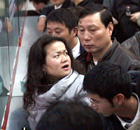Economy
Sign of the new times: Foreign money to China surging
By Ding Qingfen (China Daily)
Updated: 2009-12-17 08:13
 |
Large Medium Small |
China's foreign direct investment (FDI) reached its highest total in 16 months during November, sustaining the rising trend since August, a clear signal that the nation's speedy economic recovery is attracting more foreign investors.
China's FDI rose by 7 percent in August, the first monthly growth since last October when the financial crisis landed. Foreign investment grew by 19 percent in September.
The growth for four consecutive months has saved the total FDI from dropping by double digits during the past 11 months. China's FDI fell by 9.9 percent to $77.9 billion from January to November, said the Ministry of Commerce.
"China's ongoing economic recovery and the low reference point last year are the reasons behind (November's growth)," said Li Wei, an economist from Standard Chartered China.
While developed economies, including the United States and Europe, are still weak, China's GDP for the third quarter grew by 8.9 percent year-on-year, one percentage point higher than the second quarter.
The World Bank predicted recently that China's GDP will grow by 8.4 percent for the year and 8.7 percent in the upcoming year, much higher than that of developed nations.
"China's amazingly high economic growth has and will keep it the most attractive destination for international investors," said Li Xiaogang, a professor with foreign investment research center under the Shanghai Academy of Social Sciences.
The FDI will grow steadily in the next few months with the monthly figure possibly remaining in the range of $7 billion to $8 billion, predicted the Ministry of Commerce.
During the three-day central economic work conference that ended on Dec 7, President Hu Jintao said that China will take efforts to expand domestic spending in the coming year as one way to support stable economic growth.
"More global companies will flock into sectors related to domestic consumption, such as the service industry, pharmaceuticals, environmental protection and retailing, to tap business opportunities," said Li.
And there is growing interest in spending-driven sectors from overseas.
In the pharmaceutical sector, Novartis International AG, the world's sixth largest pharmaceutical, said in November it will inject $1 billion to strengthen research capabilities in China in five years, to cash in on the nation's rapidly growing medical business industry under the healthcare reform. It also signed an agreement with Tianyuan Bio-pharm to invest in and acquire business from the leading vaccine producer in China.
According to the Ministry of Commerce, investment from developed regions, including the US and Europe, declined in November, but those from neighboring nations represented by ASEAN (Association of Southeast Asian Nations) grew by margins.
This year, China has taken measures to promote FDI. Song Zhe, head of the Chinese mission to the European Union, said on Tuesday that the nation will step up efforts to boost foreign investment, including opening more opportunities in the service, hi-tech and energy-saving industries; and encouraging foreign companies to be listed domestically.
Xin Zhiming contributed to the story











